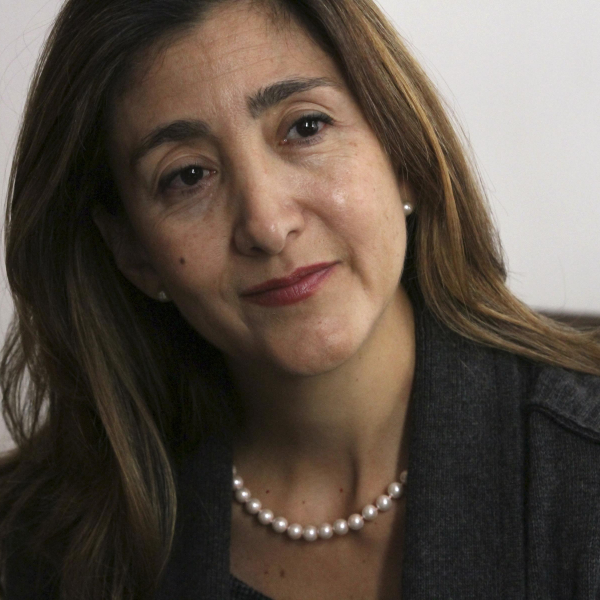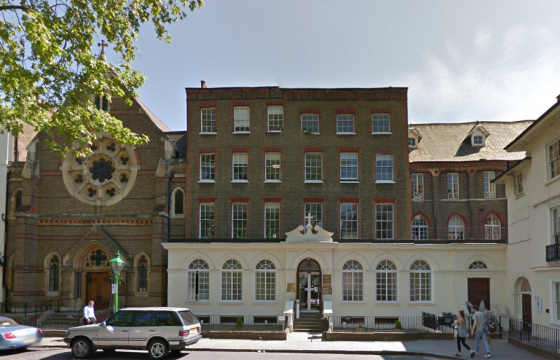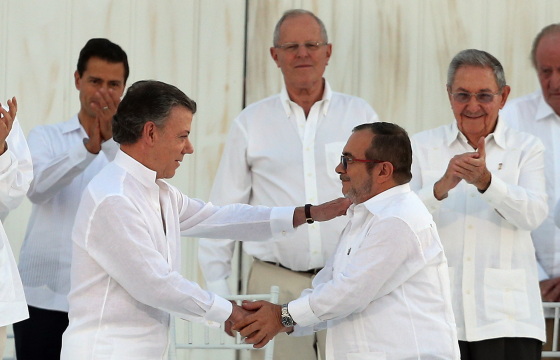Colombian president Juan Manuel Santos and the rebel Farc leader Rodrigo Londono have signed an historic peace agreement ending 52 years of civil war in the country.
Rebel leader Londono - who is known as Timochenko - apologised for the part in the conflict played by the Fuerzas Armadas Revolucionarias de Colombia (Farc) at a signing ceremony in Cartagena yesterday while Santos evoked the Colombian national anthem when he told those gathered, which included 15 presidents, three former presidents, and 27 foreign ministers headed by the US Secretary of State John Kerry, that "the horrible night has ceased".
“In the name of the Farc I ask sincere forgiveness to all the victims of the conflict and for all the pain we may have caused in this war,” Timochenko said after signing the peace agreement alongside the president with pens made out of bullets to symbolise the transition of bullets into education and future and wearing white to signify peace.
At the signing, Santos told those gathered: "Colombia celebrates, the planet celebrates because there is one less war in the world. We are being reborn to launch a new era of reconciliation and of building peace. Let us all be prepared to disarm our hearts."
The conflict began in 1964 with the formation of the Farc which was made up of small farmers with Communist sympathies who were railing at the staggering levels of inequality in the country. A very small elite owned almost all of the land in Colombia - for the most part because the Colombian state sold off large percentages of it to private owners at the turn of the 20th century to pay off debts. More than 260,000 people were killed in the conflict and more than 6 million people were forced to flee their homes in a country with a population of 47 million people.
Also in Cartagena for the historic agreement was Vatican secretary of state Cardinal Pietro Parolin who told a gathering of 2,500 Catholics at the St Peter Claver Church nearby: "This country of Catholics has come together in prayer. Colombians have lived through forced displacements and violence. ... And that is why we need to find the road to peace and justice.
"Colombia should begin to ease the pain of so many of its people by working to build a better future and by rebuilding the dignity of those who have suffered," Parolin said, adding that Pope Francis has paid close attention to the peace process in Colombia.
| INGRID BETANCOURT SHARES HER EXPERIENCE OF HOSTAGE AT THE HANDS OF FARC | ||
 |
One of the world’s longest insurgencies has come to an end with a deal between the Colombian Government and the rebel group Farc. Here, a former hostage, held captive for six years, explains why she backs the deal and the efforts at reconciliation |
Parolin, Catholic News Service reported, said the peace agreement, the culmination of four years of negotiations, is a historical marker for a country that has been deeply affected by the war. "We don't consider this just another event," he said. "This is a manifestation of the trust on the part of the Colombian people."
On the steps of the church before Parolin's liturgy Kofi Annan, who was secretary-general of the United Nations for a decade of the civil war, between 1997 and 2006, said: "I hope it will inspire other countries in the world that are in conflict, such as Syria, where people are killing each other. It can show them that peace is possible."
The next and many hope final step in the process takes place on 2 October when the Colombian people go to the polls for a referendum on whether to ratify the agreement. While opinion polls suggest that the peace agreement is overwhelmingly favourite to be approved, the Colombian government's chief peace negotiator has warned that any failure to vote yes will be a "leap into the abyss" for the South American country that will take a decade and many lives to fix.
"If a 'no' vote wins, it simply means it's all over," Humberto de la Calle told Reuters just hours before the signing. "Experience shows that in Colombia when a peace process is interrupted it takes about a decade before it can get back on track," Humberto de la Calle told Reuters. "Colombians better prepare for a new party with radical positions to enter the field," said de la Calle. "The Farc won't change its ideology."
But Timochenko promised that there would be no return to war. He told the Observer: "All Colombians have felt the pain, for one reason or another – the pain of a mother guerrilla fighter is the same as the pain of the mother of a soldier. We are from the same fatherland, so we cannot use this process to throw salt into the wounds of the other side. It’s about how we agree to heal those wounds, not repeat them. We cannot sow the seeds of another conflict.”




 Loading ...
Loading ...